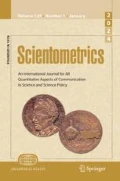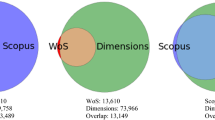Abstract
In this paper, I will argue that the process of ageing in scientific publications on the one hand, and the process of obsolescence and forgetting to which all kinds of phenomena, people and events are exposed on the other, develop with the same speed. Whereas in the literature on the subject it is stated that the speed of the ageing of scientific literature is exponential, it is shown that the decay from 'age 4' is best described by an inverse function, as was already brought to light in reference to forgetting of people and events as measured by the frequencies of calendar years in large text corpora. The empirical bases are SCI data as presented by Nakamoto and various files of reference data collected by the author. It is shown that the decay curve of the reference frequencies from 'age 4' backwards is independent of time.
Similar content being viewed by others
References
M. B. Line, A. Sandison, Progress in documentation. ‘Obsolescence’ and changes in the use of literature with time, Journal of Documentation, 30(3) (1974) 284–350.
T. M. Heisey, Paradigm agreement and literature obsolescence: a comparative study in the literature of the Dead Sea scrolls, Journal of Documentation, 44(4) (1988) 285–301.
H. Nakamoto, Synchronous and diachronous citation distributions, In: L. Egghe and R. Rousseau (Eds), Informetrics 87/88. Select Proceedings of the First International Conference on Bibliometrics and Theoretical Aspects of Information Retrieval, Diepenbeek, Belgium, 25–28 August 1987, Elsevier Science Publishers, Amsterdam, 1988.
B. Allen, J. Qin, F. W. Lancaster, Persuasive communities: A longitudinal analysis of references in the Philosophical Transactions of the Royal Society, 1665–1990, Social Studies of Science, 24 (1994) 279–310.
T. Pollmann, On forgetting the historical past, Memory and Cognition, 26(2) (1998) 320–329.
A. J. Meadows, Communication in Science, Butterworth & Co, London, 1974.
V. M. Motylev, The main problems of studying literature ageing, Scientometrics, 15(1–2) (1989) 97–109.
J. Vlachy, Citation histories of scientific publications. The data sources, Scientometrics, 7(3–6) (1985) 505–528.
E. R. Stinson, F. W. Lancaster, Synchronous versus diachronous methods in the measurement of obsolescence by citation studies, Journal of Information Science, 13 (1987) 65–74.
G. Aston, L. Burnard, The BNC Handbook. Exploring the British National Corpus with Sara, Edinburgh University Press, Edinburgh, 1998.
T. Pollmann, The process of cognitive distance. A quantitative analysis of some aspects of historical culture, Historical Social Research, 23(4) 1998 79–93.
T. Pollmann, The ageing process of historical knowledge, (in preparation).
D. J. de Solla Price, Citation measures of bard science, soft science, technology, and nonscience. In: C. E. Nelson, D. K. Pollock (Eds), Communication among Scientists and Engineers, Heath, Lexington, MA, 1970, pp. 3–22.
Author information
Authors and Affiliations
Rights and permissions
About this article
Cite this article
Pollman, T. Forgetting and the Ageing of Scientific Publications. Scientometrics 47, 43–54 (2000). https://doi.org/10.1023/A:1005613725039
Issue Date:
DOI: https://doi.org/10.1023/A:1005613725039




